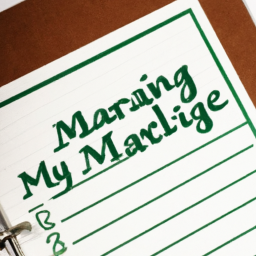Can I save my marriage? This is a question that many couples find themselves asking when faced with relationship challenges and difficulties. Whether it’s due to communication issues, trust problems, or simply growing apart, the desire to salvage a marriage and restore the love and connection is a common one. In this blog post, we will explore various strategies, insights, and expert advice to help you navigate the rocky waters of marriage and discover if there is hope for reconciliation. If you are wondering whether it is possible to save your marriage and rebuild a strong and fulfilling partnership, keep reading to find guidance and support in your journey.
Recognizing the Signs of a Troubled Marriage
Introduction
Marriage is a beautiful union between two individuals, but it is not always smooth sailing. Every relationship goes through ups and downs, and sometimes, these challenges can lead to a troubled marriage. Recognizing the signs of trouble is the first step towards saving your marriage. In this article, we will explore the common signs of a troubled marriage and provide you with a step-by-step guide on how to address these issues and work towards a healthier and happier relationship.
Signs of a Troubled Marriage
1. Communication Breakdown
Communication is the foundation of any successful marriage. When communication starts to break down, it can be a clear sign that something is wrong. You may notice that you and your partner are no longer having meaningful conversations or that you are constantly arguing over trivial matters. Lack of communication can lead to misunderstandings, resentment, and a growing emotional distance between partners.
To address this issue, it is crucial to create a safe and open environment for communication. Set aside dedicated time to talk and actively listen to each other’s concerns. Practice empathy and avoid blaming or criticizing your partner. Consider seeking professional help from a couples therapist who can guide you in improving your communication skills.
2. Emotional Disconnection
One of the most significant signs of a troubled marriage is the feeling of emotional disconnection. You may feel like you and your partner are drifting apart, no longer sharing the same goals, dreams, or interests. Emotional disconnection can manifest as a lack of intimacy, both physical and emotional, and a sense of loneliness within the relationship.
To reconnect emotionally, it is essential to prioritize quality time together. Plan activities that you both enjoy and create opportunities for deep conversations. Express your feelings and needs honestly and encourage your partner to do the same. Building emotional intimacy takes time and effort, but it is crucial for a healthy and fulfilling marriage.
3. Lack of Trust
Trust is the cornerstone of any successful marriage. When trust is broken, it can be challenging to rebuild. Signs of a lack of trust may include secrecy, constant suspicion, or past infidelity. Trust issues can erode the foundation of your relationship and create a toxic environment.
Rebuilding trust requires honesty, transparency, and consistency. Be willing to address the underlying issues that led to the breakdown of trust and take responsibility for your actions. Trust-building exercises, such as open communication and setting clear boundaries, can help rebuild trust over time. However, it is important to remember that rebuilding trust takes patience and commitment from both partners.
Conclusion
Recognizing the signs of a troubled marriage is the first step towards saving it. Communication breakdown, emotional disconnection, and lack of trust are common signs that something is wrong in a marriage. By addressing these issues head-on and seeking professional help if necessary, you can work towards rebuilding a stronger and healthier relationship. Remember, saving a marriage requires effort, commitment, and a willingness to grow both individually and as a couple.

Effective Communication Strategies for Saving Your Marriage
Introduction
Communication is the foundation of any successful relationship, and when it comes to saving your marriage, it becomes even more crucial. Effective communication strategies can help you and your spouse navigate through difficult times, resolve conflicts, and rebuild trust. In this article, we will explore some key communication techniques that can pave the way to saving your marriage.
1. Active Listening
Active listening is an essential skill that can greatly improve communication between you and your spouse. It involves fully focusing on what your partner is saying, without interrupting or formulating a response in your mind. To practice active listening, maintain eye contact, show genuine interest, and provide verbal and non-verbal cues to let your spouse know you are fully present.
When your partner is speaking, avoid distractions and give them your undivided attention. This means putting away your phone, turning off the TV, and finding a quiet space where you can have a conversation without interruptions. By actively listening, you show respect for your spouse’s thoughts and feelings, and this can create a safe and supportive environment for open communication.
Furthermore, active listening also involves paraphrasing and reflecting back what your partner has said. This demonstrates that you truly understand their perspective and encourages them to share more. For example, you can say, “So, what I’m hearing is that you feel neglected when I work late, is that right?” This validates their emotions and allows for deeper understanding.
2. Expressing Emotions Effectively
Emotions play a significant role in every relationship, and expressing them effectively is crucial for saving your marriage. Bottling up emotions or expressing them in an aggressive manner can lead to resentment and further communication breakdown. Instead, aim to express your emotions assertively and constructively.
Start by using “I” statements to convey your feelings. For example, say “I feel hurt when you ignore me,” instead of “You always ignore me.” This approach avoids blaming your partner and focuses on your emotions, which are valid and important. Additionally, be specific about the situation or behavior that triggered your emotions, as this helps your spouse understand the context.
It’s also essential to choose the right time and place to express your emotions. Avoid discussing sensitive topics when both of you are tired, stressed, or in public. Find a calm and private setting where you can have an open and honest conversation without distractions. By expressing your emotions effectively, you create a space for empathy, understanding, and resolution.
3. Non-Verbal Communication
Communication is not just about words; non-verbal cues also play a significant role in conveying messages and emotions. Pay attention to your body language, facial expressions, and tone of voice, as they can either support or undermine your words.
When engaging in a conversation with your spouse, maintain an open posture, make eye contact, and avoid crossing your arms, as these gestures can create a defensive barrier. Smile, nod, or use other positive facial expressions to show that you are receptive and engaged. Your tone of voice should be calm and respectful, even when discussing challenging topics.
It’s important to be aware of your spouse’s non-verbal cues as well. Sometimes, their body language may reveal more than their words. If you notice signs of discomfort or defensiveness, take a step back and ask if they are okay or if they need a break. Being attuned to non-verbal communication can help you adjust your approach and create a more productive conversation.
Conclusion
Effective communication is a vital skill for saving your marriage. By practicing active listening, expressing emotions effectively, and being mindful of non-verbal cues, you can create a safe and supportive environment for open and honest communication. Remember, saving a marriage takes effort from both partners, and effective communication strategies can help you rebuild trust, resolve conflicts, and strengthen your bond.

Seeking Professional Help: Marriage Counseling and Therapy
Introduction
Marriage is a beautiful union between two individuals, but it can also be challenging and require effort from both parties to maintain its health and longevity. Sometimes, despite our best efforts, conflicts arise that seem insurmountable. In such cases, seeking professional help through marriage counseling and therapy can be a valuable tool to save your marriage. In this article, we will explore the benefits of marriage counseling, how to find the right therapist, and what to expect during the process.
The Benefits of Marriage Counseling
Marriage counseling offers numerous benefits that can help couples navigate through their challenges and strengthen their bond. Here are some key advantages:
1. Objective Perspective
One of the primary benefits of marriage counseling is gaining an objective perspective. A skilled therapist can provide an unbiased viewpoint, helping you and your partner see the bigger picture and understand each other’s perspectives better. This newfound understanding can foster empathy and open up channels of effective communication.
2. Improved Communication
Communication is the foundation of any successful relationship. Marriage counseling can teach you and your partner effective communication techniques, such as active listening and assertive expression. By learning how to communicate more effectively, you can address conflicts in a healthy and constructive manner, reducing misunderstandings and resentment.
3. Conflict Resolution
All relationships experience conflicts, but it’s how we handle them that determines the outcome. Marriage counseling equips couples with conflict resolution skills, teaching them how to navigate disagreements without damaging the relationship. Therapists can guide you through techniques like compromise, negotiation, and finding common ground, enabling you to resolve conflicts in a respectful and mutually satisfying way.
4. Emotional Support
Marriage counseling provides a safe space for both partners to express their emotions and vulnerabilities. A therapist can offer emotional support and validation, creating an environment where both individuals feel heard and understood. This support can help alleviate stress, anxiety, and other negative emotions that may be affecting the marriage.
5. Identifying Underlying Issues
Sometimes, conflicts in a marriage can be symptoms of deeper underlying issues. Marriage counseling can help uncover these root causes, whether they stem from past traumas, unresolved conflicts, or individual struggles. By addressing these underlying issues, couples can work towards healing and rebuilding their relationship on a stronger foundation.
Finding the Right Therapist
Choosing the right therapist is crucial for the success of your marriage counseling journey. Here are some factors to consider when searching for a therapist:
1. Qualifications and Experience
Look for a licensed marriage and family therapist (LMFT) who specializes in couples counseling. Ensure they have the necessary qualifications and experience to address your specific concerns. Reading online reviews and seeking recommendations from trusted sources can also help you gauge their expertise.
2. Compatibility
A strong therapeutic alliance is essential for effective counseling. Schedule an initial consultation with potential therapists to assess their compatibility with you and your partner. Trust your instincts and choose someone with whom both of you feel comfortable opening up and sharing your thoughts and feelings.
3. Approach and Techniques
Different therapists employ various approaches and techniques in their practice. Research the therapeutic modalities they use and determine whether they align with your preferences and needs. Some common approaches include cognitive-behavioral therapy (CBT), emotionally-focused therapy (EFT), and solution-focused brief therapy (SFBT).
What to Expect During Marriage Counseling
Embarking on the journey of marriage counseling can be both exciting and daunting. Here’s what you can expect during the process:
1. Initial Assessment
In the first session, the therapist will conduct an initial assessment to gather information about your relationship, individual backgrounds, and concerns. This assessment helps the therapist tailor the counseling approach to your specific needs.
2. Goal Setting
Together with the therapist, you and your partner will identify goals for the counseling process. These goals can range from improving communication to resolving specific conflicts. Setting clear goals helps guide the therapy sessions and provides a sense of direction.
3. Active Participation
Marriage counseling is a collaborative process that requires active participation from both partners. This includes attending sessions regularly, completing assigned homework or exercises, and implementing the strategies discussed in therapy into your daily lives. The more engaged you are, the more likely you are to see positive changes in your relationship.
4. Duration and Frequency
The duration and frequency of marriage counseling sessions can vary depending on the complexity of your concerns and the progress you make. Some couples find resolution in a few sessions, while others may benefit from long-term therapy. Discuss the recommended duration and frequency with your therapist to establish realistic expectations.
5. Confidentiality
Confidentiality is a fundamental aspect of therapy. A reputable therapist will uphold strict confidentiality, ensuring that what is discussed within the therapy room remains private. This creates a safe space for open and honest communication.
Conclusion
Seeking professional help through marriage counseling and therapy can be a transformative experience for couples facing challenges in their relationship. It offers a supportive environment to explore underlying issues, improve communication, and develop effective conflict resolution skills. By finding the right therapist and actively participating in the process, you can work towards saving your marriage and building a stronger, more fulfilling partnership. Remember, seeking help is a sign of strength and commitment to the well-being of your relationship.

Rebuilding Trust and Intimacy in a Failing Marriage
The Importance of Trust and Intimacy
Trust and intimacy are the foundation of a strong and healthy marriage. When trust is broken or intimacy starts to fade, it can lead to a failing marriage. Rebuilding trust and intimacy requires time, effort, and commitment from both partners. It may not be easy, but with the right strategies and mindset, it is possible to save your marriage and restore the trust and intimacy that once existed.
Before diving into the steps to rebuild trust and intimacy, it’s essential to understand the reasons behind their erosion. Trust can be broken due to infidelity, dishonesty, or a series of broken promises. Intimacy, on the other hand, can diminish over time due to lack of communication, emotional disconnection, or unresolved conflicts. Identifying the root causes will help you address them effectively.
Step 1: Open and Honest Communication
The first step towards rebuilding trust and intimacy is to establish open and honest communication with your partner. This means creating a safe space where both of you can express your feelings, concerns, and desires without fear of judgment or criticism.
Start by setting aside dedicated time for meaningful conversations. Avoid distractions and actively listen to your partner’s thoughts and emotions. Be vulnerable and share your own feelings as well. It’s important to be patient and understanding during these conversations, as it may take time for both of you to open up completely.
Remember, effective communication is a two-way street. Encourage your partner to express themselves and validate their emotions. Avoid interrupting or dismissing their concerns. By fostering open and honest communication, you lay the foundation for rebuilding trust and intimacy.
Step 2: Rebuilding Trust
Rebuilding trust is a gradual process that requires consistent effort and transparency. It’s important to acknowledge the pain caused by the breach of trust and take responsibility for your actions. Apologize sincerely and demonstrate your commitment to change.
Actions speak louder than words when it comes to rebuilding trust. Be reliable and consistent in your behavior. Follow through on your promises and commitments. Avoid any behavior that could trigger doubt or suspicion in your partner.
Rebuilding trust also involves being transparent about your actions and whereabouts. Share your thoughts, feelings, and experiences openly with your partner. Be patient and understanding if your partner needs reassurance or asks for more information. Over time, as trust is gradually restored, you can work together to establish boundaries and rebuild a sense of security in your marriage.
Step 3: Cultivating Intimacy
Intimacy is not just about physical connection; it encompasses emotional, intellectual, and spiritual closeness as well. Cultivating intimacy requires intentional effort and a willingness to prioritize your relationship.
Start by reconnecting emotionally with your partner. Show empathy, understanding, and support. Engage in activities that you both enjoy and create opportunities for quality time together. This could be going on dates, taking up a new hobby together, or simply having meaningful conversations.
Physical intimacy is also a vital aspect of a healthy marriage. Explore ways to reignite the spark in your relationship. Communicate your desires and be open to trying new things. Remember that physical intimacy is not just about the act itself but also about the emotional connection it fosters.
Lastly, don’t neglect the importance of intellectual and spiritual intimacy. Engage in stimulating conversations, share your thoughts and dreams, and support each other’s personal growth. By nurturing all aspects of intimacy, you can create a deep and fulfilling connection with your partner.
Conclusion
Rebuilding trust and intimacy in a failing marriage is a challenging but worthwhile journey. It requires open communication, a commitment to change, and consistent effort from both partners. By following these steps, you can gradually rebuild trust, foster intimacy, and save your marriage. Remember, it’s never too late to work on your relationship and create a stronger, more fulfilling future together.

Steps to Take to Save Your Marriage from Divorce
Marriage is a beautiful union between two individuals who have decided to spend their lives together. However, sometimes marriages face challenges that can lead to the possibility of divorce. If you find yourself questioning whether you can save your marriage, here are some steps to consider:
1. Communication is Key
One of the most important aspects of any relationship, including marriage, is effective communication. Many marital issues arise due to poor communication or a lack thereof. To save your marriage, it is crucial to open up the lines of communication with your partner.
Start by creating a safe and judgment-free space where both of you can express your thoughts and feelings. Be an active listener and encourage your partner to share their perspective as well. Avoid interrupting or becoming defensive during these conversations.
Remember, effective communication involves both talking and listening. It’s important to express your needs and concerns clearly while also being receptive to your partner’s thoughts and feelings. By improving communication, you can begin to address the underlying issues in your marriage.
2. Seek Professional Help
If you and your partner are struggling to resolve your marital issues on your own, seeking professional help can be immensely beneficial. Marriage counseling or therapy can provide a safe and neutral environment where both of you can explore your concerns and work towards finding solutions.
A trained therapist can guide you through various techniques and exercises to improve communication, rebuild trust, and strengthen your emotional connection. They can also help you identify unhealthy patterns or behaviors that may be contributing to the problems in your marriage.
Remember, seeking professional help is not a sign of weakness but rather a proactive step towards saving your marriage. A therapist can provide you with the necessary tools and guidance to navigate through the challenges you are facing.
3. Take Responsibility for Your Actions
In any marriage, it’s important to take responsibility for your own actions and behaviors. It’s easy to blame your partner for the problems in your relationship, but it takes courage to acknowledge your own shortcomings and work on them.
Reflect on your own behavior and identify areas where you can make positive changes. This might involve addressing your own insecurities, working on your communication skills, or seeking personal therapy to work through unresolved issues from your past.
By taking responsibility for your actions, you demonstrate to your partner that you are committed to personal growth and the betterment of your marriage. This can inspire them to do the same and create a positive cycle of change within your relationship.
4. Make Time for Each Other
In the midst of busy schedules and responsibilities, it’s easy for couples to neglect quality time together. However, spending time with your partner is essential for maintaining a strong and healthy marriage.
Make a conscious effort to prioritize your relationship by setting aside dedicated time for each other. This can involve scheduling regular date nights, planning activities you both enjoy, or simply spending uninterrupted time talking and reconnecting.
Remember, the quality of time spent together is more important than the quantity. Focus on being present and engaged during these moments, and use them as an opportunity to deepen your emotional bond.
5. Embrace Compromise and Forgiveness
Marriage is a partnership that requires compromise and forgiveness. It’s important to recognize that both you and your partner will have different perspectives, needs, and desires. Learning to find common ground and meet each other halfway is crucial for saving your marriage.
Practice empathy and try to understand your partner’s point of view, even if you disagree. Look for solutions that benefit both of you rather than focusing solely on your individual desires. This willingness to compromise can create a more harmonious and balanced relationship.
In addition, forgiveness plays a vital role in saving a marriage. Holding onto grudges and resentment only breeds negativity and distance between partners. Learn to let go of past hurts and work towards rebuilding trust and intimacy.
Remember, saving a marriage takes time, effort, and commitment from both partners. By following these steps, you can begin the journey towards healing and strengthening your relationship. With open communication, professional guidance, personal growth, quality time, and a willingness to compromise, you can save your marriage from the brink of divorce.
Summary Snapshot
In the face of marital difficulties, it is natural to wonder if it is possible to save a failing marriage. The answer, however, is not a simple yes or no. Saving a marriage requires commitment, effort, and a willingness to work through challenges together. This blog post explores the possibility of salvaging a troubled marriage and provides some guidance on how to navigate the journey.
The first step in saving a marriage is acknowledging the issues and being open to addressing them. Communication breakdown, lack of intimacy, and trust issues are common problems that can erode a relationship. Seeking professional help, such as marriage counseling, can provide a safe space to express concerns and learn effective communication techniques. Additionally, both partners need to be committed to making changes and willing to put in the effort required to rebuild trust and strengthen the bond.
While saving a marriage is possible, it is important to recognize that not all marriages can or should be saved. In cases of abuse, addiction, or irreparable damage, prioritizing personal safety and well-being may be necessary. Ultimately, the decision to save a marriage lies with the individuals involved, and seeking guidance from professionals or trusted friends can help navigate this difficult process.
Here are this week’s Top Questions and Answers
Q1: Can I save my marriage?
A1: Yes, it is possible to save your marriage. Many couples have successfully overcome challenges and rebuilt their relationships.
Q2: What are some signs that my marriage may be in trouble?
A2: Some signs that your marriage may be in trouble include constant arguments, lack of communication, loss of intimacy, infidelity, and feelings of resentment or indifference.
Q3: How can I improve communication with my spouse?
A3: Improving communication involves active listening, expressing your thoughts and feelings clearly, avoiding blame or criticism, and seeking professional help if needed.
Q4: What steps can I take to rebuild trust in my marriage?
A4: Rebuilding trust takes time and effort. It involves being honest and transparent, keeping your promises, showing remorse, and being patient with your partner’s healing process.
Q5: How can we reignite the spark and intimacy in our marriage?
A5: To reignite the spark, prioritize quality time together, engage in activities you both enjoy, express affection and appreciation, and consider seeking guidance from a relationship counselor.
Q6: Is it necessary to seek professional help to save my marriage?
A6: While not all marriages require professional help, seeking guidance from a marriage counselor or therapist can provide valuable tools, insights, and support to navigate through challenges.
Q7: How can we manage conflicts and disagreements in a healthy way?
A7: Managing conflicts involves active listening, compromising, respecting each other’s opinions, avoiding personal attacks, and finding mutually beneficial solutions.
Q8: Can a marriage survive infidelity?
A8: Yes, a marriage can survive infidelity, but it requires both partners’ commitment to rebuilding trust, open communication, forgiveness, and often the guidance of a professional therapist.
Q9: How do I know if it’s worth saving my marriage?
A9: Deciding whether to save a marriage is a deeply personal choice. Consider factors such as your commitment, willingness to work on the relationship, and the overall happiness and well-being of both partners.
Q10: What if my spouse isn’t willing to work on the marriage?
A10: Saving a marriage requires effort from both partners. If your spouse isn’t willing to work on the marriage, it may be helpful to seek individual counseling or therapy to explore your options and find support during this challenging time.

About Sarah:
Sarah is a certified marriage counselor and co-founder of SaveOurVows.com. Her expertise lies in helping couples reignite the spark in their relationships and create a lasting bond built on trust and understanding. As a devoted wife and mother, Sarah draws from her personal experiences and professional training to offer valuable guidance to couples seeking to save their marriages. Her articles focus on nurturing emotional connection and fostering a supportive environment where love can thrive.
About John:
John is a relationship expert and co-founder of SaveOurVows.com. With a Master’s degree in Marriage and Family Therapy, John is passionate about helping couples navigate the challenges that come with marriage. Having experienced the highs and lows in his own relationship with Sarah, he understands the complexities of married life and believes in the power of effective communication and emotional intimacy. John’s articles offer practical tips and insights to empower couples in their journey to a stronger and more fulfilling marriage.
Together as a Team:
John and Sarah’s mission is to provide a compassionate and supportive platform for couples in need of guidance and encouragement. Through their collaborative efforts, they aim to inspire love and commitment in marriages worldwide. As a couple themselves, they embody the principles they teach, and their dedication to helping others strengthen their relationships is the driving force behind SaveOurVows.com.
Favorite Topics:
Rekindling Romance: John and Sarah believe that rekindling the romance is an essential aspect of any successful marriage. Their articles on this topic offer creative ideas and practical strategies to keep the passion alive.
Effective Communication: Communication is the foundation of a healthy relationship. John and Sarah share expert tips to improve communication between couples and resolve conflicts constructively.
Building Trust: Trust is paramount in any marriage. Through their articles, they help couples rebuild trust and create a secure and loving environment.
Join Sarah and John’s Journey:
Sarah and John invite you to join them on their journey of empowering couples to save their vows and build lasting and fulfilling marriages. Their insights and advice aim to make a positive impact on your relationship, fostering a bond that stands the test of time.






